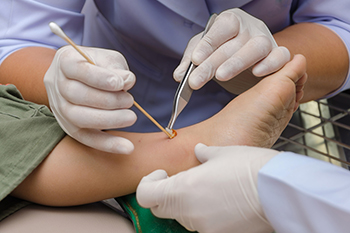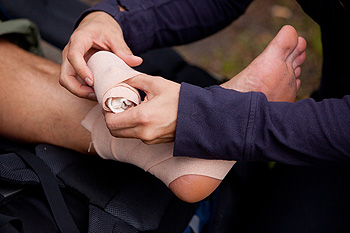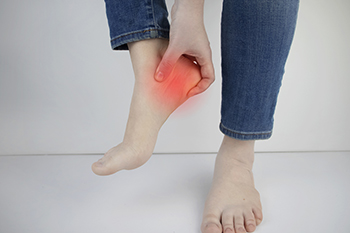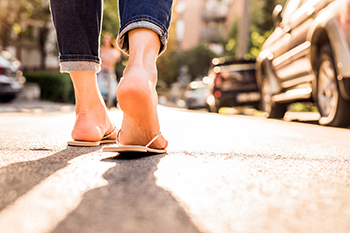3885 S. Decatur Blvd Suite #1080
Las Vegas, NV 89103

Diabetic patients can often be at an increased risk of developing foot conditions. For example, diabetic patients can be susceptible to what is known as foot ulcers. Ulcers are essentially open sores that do not easily heal in a timely fashion. There are many things that can potentially increase a diabetic’s susceptibility to developing ulcers. For example, if a diabetic wears shoes that do not fit correctly because they are too tight for that individual, then they might be more likely to develop ulcers. Also, obesity or being overweight is another risk factor that is linked to an increased risk of foot ulcers as a diabetic. Lastly, excessive alcohol consumption as a diabetic is strongly linked to the development of ulcers among those who suffer from diabetes. If you are living with diabetes, then it is highly suggested that you contact a podiatrist today for treatment and advice.
Wound care is an important part in dealing with diabetes. If you have diabetes and a foot wound or would like more information about wound care for diabetics, consult with Loren Hansen, DPM from Ankle & Foot Medical Center. Our doctor will assess your condition and provide you with quality foot and ankle treatment.
What Is Wound Care?
Wound care is the practice of taking proper care of a wound. This can range from the smallest to the largest of wounds. While everyone can benefit from proper wound care, it is much more important for diabetics. Diabetics often suffer from poor blood circulation which causes wounds to heal much slower than they would in a non-diabetic.
What Is the Importance of Wound Care?
While it may not seem apparent with small ulcers on the foot, for diabetics, any size ulcer can become infected. Diabetics often also suffer from neuropathy, or nerve loss. This means they might not even feel when they have an ulcer on their foot. If the wound becomes severely infected, amputation may be necessary. Therefore, it is of the upmost importance to properly care for any and all foot wounds.
How to Care for Wounds
The best way to care for foot wounds is to prevent them. For diabetics, this means daily inspections of the feet for any signs of abnormalities or ulcers. It is also recommended to see a podiatrist several times a year for a foot inspection. If you do have an ulcer, run the wound under water to clear dirt from the wound; then apply antibiotic ointment to the wound and cover with a bandage. Bandages should be changed daily and keeping pressure off the wound is smart. It is advised to see a podiatrist, who can keep an eye on it.
If you have any questions, please feel free to contact our office located in Las Vegas, NV . We offer the newest diagnostic and treatment technologies for all your foot care needs.

Countless Americans utilize the treadmill everyday as a way for them to burn their daily calories. Individuals can use the treadmill to run, jog, or simply walk. This versatility adds to the appeal of the treadmill. However, if an individual is not careful, the use of the treadmill may potentially put your feet at risk of developing an injury. For example, if an individual is not running, jogging, or walking with proper form, they could endure foot pain and/or a foot condition. These can also occur if an individual misuses the treadmill by perhaps setting the treadmill to an inappropriate incline and speed. If you are someone that frequently relies on the treadmill to get your daily dose of exercise, it is highly suggested that you contact a podiatrist who will be able to offer you individualized care and advice.
Sports related foot and ankle injuries require proper treatment before players can go back to their regular routines. For more information, contact Loren Hansen, DPM of Ankle & Foot Medical Center. Our doctor can provide the care you need to keep you pain-free and on your feet.
Sports Related Foot and Ankle Injuries
Foot and ankle injuries are a common occurrence when it comes to athletes of any sport. While many athletes dismiss the initial aches and pains, the truth is that ignoring potential foot and ankle injuries can lead to serious problems. As athletes continue to place pressure and strain the area further, a mild injury can turn into something as serious as a rupture and may lead to a permanent disability. There are many factors that contribute to sports related foot and ankle injuries, which include failure to warm up properly, not providing support or wearing bad footwear. Common injuries and conditions athletes face, including:
Sports related injuries are commonly treated using the RICE method. This includes rest, applying ice to the injured area, compression and elevating the ankle. More serious sprains and injuries may require surgery, which could include arthroscopic and reconstructive surgery. Rehabilitation and therapy may also be required in order to get any recovering athlete to become fully functional again. Any unusual aches and pains an athlete sustains must be evaluated by a licensed, reputable medical professional.
If you have any questions please feel free to contact our office located in Las Vegas, NV . We offer the newest diagnostic and treatment technologies for all your foot and ankle needs.

The pain from the foot condition known as plantar fasciitis can be debilitating. This ailment is caused by an inflamed plantar fascia, which is the band of tissue that is found on the soles of the feet. The plantar fascia connects the heel to the toes and may become torn from standing on hard surfaces all day or wearing shoes that lack adequate arch support. Additionally, there may be existing medical conditions such as obesity, abnormal foot structure, or naturally tight calves that may lead to plantar fasciitis. The heel pain associated may be worse in the morning upon arising, or after sitting for a long period. Mild relief may begin with wearing shoes that fit correctly as well as stretches that target the plantar fascia. If you are afflicted with plantar fasciitis, it is suggested that you consult with a podiatrist who can determine the best course of treatment for you.
Plantar fasciitis is a common foot condition that is often caused by a strain injury. If you are experiencing heel pain or symptoms of plantar fasciitis, contact Loren Hansen, DPM from Ankle & Foot Medical Center. Our doctor can provide the care you need to keep you pain-free and on your feet.
What Is Plantar Fasciitis?
Plantar fasciitis is one of the most common causes of heel pain. The plantar fascia is a ligament that connects your heel to the front of your foot. When this ligament becomes inflamed, plantar fasciitis is the result. If you have plantar fasciitis you will have a stabbing pain that usually occurs with your first steps in the morning. As the day progresses and you walk around more, this pain will start to disappear, but it will return after long periods of standing or sitting.
What Causes Plantar Fasciitis?
There are some risk factors that may make you more likely to develop plantar fasciitis compared to others. The condition most commonly affects adults between the ages of 40 and 60. It also tends to affect people who are obese because the extra pounds result in extra stress being placed on the plantar fascia.
Prevention
There are a variety of treatment options available for plantar fasciitis along with the pain that accompanies it. Additionally, physical therapy is a very important component in the treatment process. It is important that you meet with your podiatrist to determine which treatment option is best for you.
If you have any questions, please feel free to contact our office located in Las Vegas, NV . We offer the newest diagnostic and treatment technologies for all your foot care needs.

Flip-flops may be cute, easy, and inexpensive additions to a summer wardrobe, but they can cause problems for your feet and body. This type of footwear usually does not cushion the feet from impact when walking, particularly on harder surfaces like asphalt, and can cause foot and leg pain. Because they leave the feet exposed, one is susceptible to bites, infections, and injuries when wearing them. Also, since these shoes have a flat form, wearing them can lead to gait problems. They do not give stability to the feet or stay on the feet well and can result in muscle pain throughout the body. If you have additional questions about the effects of wearing flip-flops, it is suggested that you consult with a podiatrist for an expert opinion.
Flip-flops are not always the best choice of footwear. If you have any concerns about your feet or ankles, contact Loren Hansen, DPM from Ankle & Foot Medical Center. Our doctor will assist you with all of your foot and ankle needs.
Flip-Flops and Feet
When the weather starts warming up, people enjoy wearing flip-flops. Flip-flops are comfortable, stylish, and easy to slip on and off; they're perfect for any summer beach goer. However, these shoes can cause harm to the feet.
How Can Flip-Flops Affect Me Long-Term?
Are There Injuries Associated with Flip-Flops?
Yes. Since flip-flops are relatively weak and do not provide the same amount of support as sneakers, people who wear flip-flops regularly are more susceptible to injuries. On top of that, the open nature of the shoe makes your feet more prone to other problems, such as cuts and even infections. Common injuries and ailments include:
I like Wearing Flip-Flops. Are There Safe Alternatives?
When buying flip-flops, try to find ones that have sturdy soles and that are made of high-quality materials that will support for your feet. These flip-flops will cost more but will also last longer as a result.
If you have any questions please feel free to contact our office located in Las Vegas, NV . We offer the newest diagnostic and treatment technologies for all your foot and ankle needs.